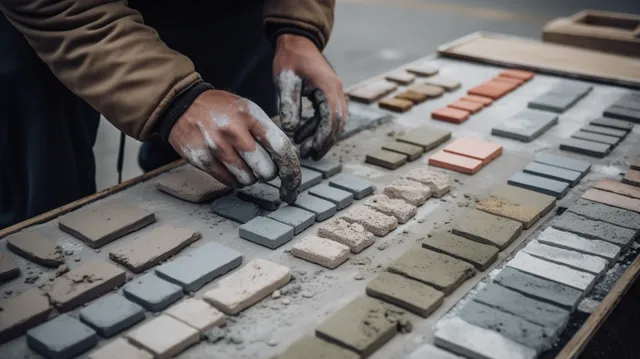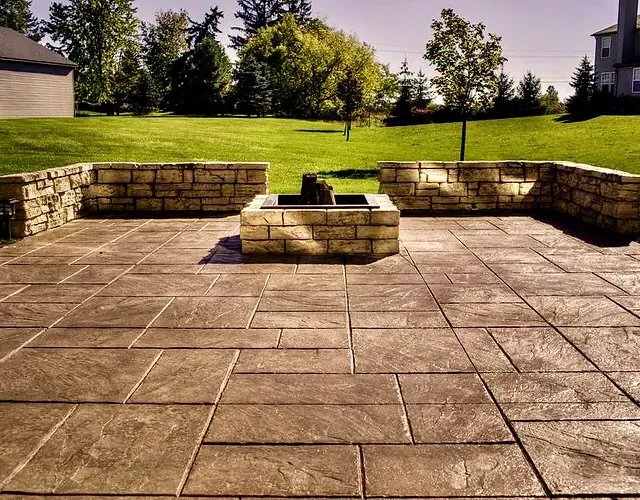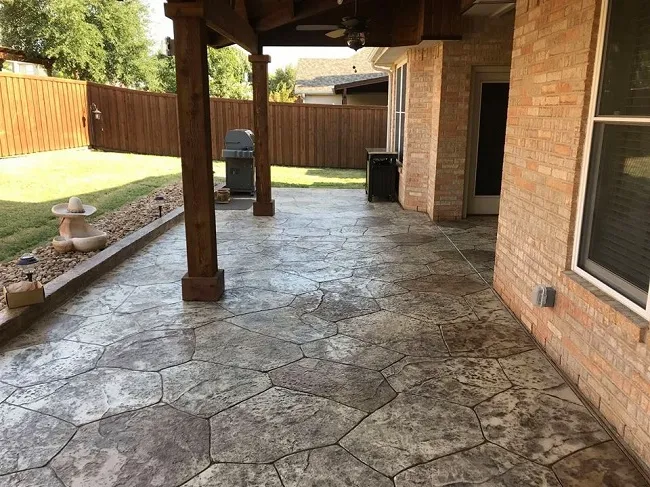Available Now
The Foundations of a Durable Home: Choosing the Right Concrete for Your Residential Project
The Foundations of a Durable Home: Choosing the Right Concrete for Your Residential Project

This article, 'Choosing the Right Concrete for Your Home's Foundation,' helps you understand how to pick the best concrete for your house. It talks about different types, what to think about when choosing, and why concrete is a good choice.
- Foundation Importance:
- Your home's foundation is crucial for its strength and longevity.
- Types of Concrete:
- Various concrete types are used in residential construction, including ready-mix concrete.
- Factors for Selecting Concrete Mix:
- Consider factors such as compressive structure, workability, durability, on-site quality control, and aggregate size when choosing the right concrete mix.
- Benefits of Using Concrete:
- Concrete offers advantages like cost-effectiveness, durability, versatility, energy efficiency, and low maintenance.
- Construction Process:
- Understand the step-by-step process of building a home foundation, from excavation to concrete installation.
Your dream home is more than just a collection of walls and a roof; it's a sanctuary, a place where memories are made, and a haven of comfort and security. To ensure your home stands strong for generations to come, one crucial factor often overlooked is the concrete foundation. As we embark on this journey to explore the world of residential concrete, I'll be your guide, breaking down the complex choices into simple, understandable insights.
Introduction
When it comes to constructing a home, the foundation is the unsung hero that quietly supports every inch of your dream. Choosing the right concrete for your residential project is not just about pouring some mixture into the ground; it's about setting the stage for your home's durability and stability.
Imagine your foundation as the sturdy roots of a mighty tree. Just as a tree's health depends on its roots, your home's stability relies on its foundation. It's the very bedrock on which your dreams are built. So, let's dive into the world of concrete and explore how to make the right choice for your home's foundation.
Types of Concrete for Residential Projects
| 1. Types of Concrete for Residential Projects: | |
|---|---|
| Type of Concrete | Recommended Use |
| Ready-Mix Concrete | Large-scale projects |
| Concrete Thickness | Driveways, slabs, sidewalks |
| Concrete Strength | Ideal psi for different projects |
| Concrete Countertops | Thickness and recommended mixes |
| Concrete Stairs | Width and rise measurements |
Before we delve into the factors that influence concrete selection, let's get to know the common types of concrete used in residential construction:
a. Ready-Mix Concrete
Concrete offers durability and longevity, making the selection of the right mix crucial. For large-scale residential projects like foundations, driveways, and sidewalks, ready-mix concrete is recommended. It's a convenient option where concrete is mixed at a plant and then delivered to your construction site. This ensures consistent quality and eliminates the need for on-site mixing.
b. Concrete Thickness and Strength
Concrete thickness and strength vary depending on the project's requirements:
- A typical pour for driveways, slabs, and sidewalks is 4 inches thick, with a strength of 4,500 psi (pounds per square inch) considered ideal after a month's cure.
- Home foundations require a thicker pour of 8-10 inches and a psi of 3,500-4,000.
- Garage and interior floors should have a minimum strength of 2,500 psi, with 4,500 psi being ideal.
- Concrete countertops should have a thickness of 1.5-2 inches, with specific mixes recommended for durability and longevity.
- Concrete stairs typically have a width of at least 9 inches with a rise of 6-10 inches between steps.

Factors to Keep In Mind During Selecting Concrete Mix for Your Project
| 2. Factors for Selecting Concrete Mix: | |
|---|---|
| Key Factors | Considerations |
| Compressive Structure and Strength | Project-specific requirements |
| Workability | Ease of placement and shaping |
| Durability | Proper water-cement ratio |
| On-Site Quality Control Measures | Monitoring and quality assurance |
| Maximum Nominal Size and Structure | Impact on mix strength and workability |
The ideal concrete mix is determined by environmental conditions, structural requirements, jobsite conditions, and available raw materials. Key determinants for concrete mix selection include:
- Compressive Structure and Strength: The strength of concrete is critical, and it depends on the specific requirements of your project.
- Workability: Workability is crucial for satisfactory performance during construction. The mix should be easy to place and shape while maintaining its desired properties.
- Durability: Durability is achieved through the proper water-cement ratio. A well-balanced mix ensures your concrete stands up to environmental challenges.
- On-Site Quality Control Measures: Monitoring and quality control are essential during the mixing and pouring process to ensure the concrete meets your project's specifications.
- Maximum Nominal Size and Structure of the Concrete: The size and structure of the concrete aggregates used affect the mix's strength and workability.
The Benefits of Using Concrete
Concrete is a versatile material that offers numerous benefits for residential projects:
- Cost-Effective: Concrete is a cost-effective choice for construction, offering excellent value for money.
- Durability: It's known for its durability and can withstand the test of time, reducing the need for costly repairs.
- Versatility: Concrete hardens easily at ambient temperatures and can be molded into complex shapes, allowing for unique design possibilities.
- Energy Efficiency: Concrete production consumes less energy compared to steel, contributing to a more sustainable construction process.
- Water and Temperature Resistance: It offers water resistance and can withstand extreme temperatures, making it ideal for various climates.
- Eco-Friendly: Concrete can recycle waste products and is an environmentally friendly choice.
- Low Maintenance: Concrete structures require minimal maintenance over the years, saving you time and money.
- Ideal for Coastal Construction: Its resistance to water makes it an excellent choice for coastal construction.
- Safety and Soundproofing: Concrete doesn't reflect light, making it safe for roads and runways, and offers soundproofing properties.
Step-by-Step Guide to Building a Home Foundation
Understanding the construction process is essential for making informed decisions. Here's a simplified overview:
- Excavation: The process begins with excavation, where the construction site is cleared and leveled to create space for the foundation.
- Footings: Footings are like the foundation's feet; they provide support and distribute the load evenly. The type and size of footings depend on your home's design and the soil conditions.
- Foundation Installation: Once the footings are in place, the concrete foundation is constructed. Proper concrete selection is crucial at this stage to ensure the foundation's strength and longevity.
Benefits of Choosing the Right Concrete
Selecting the right concrete for your residential project offers several long-term advantages:
- Durability: The right concrete can withstand the test of time, reducing the need for costly repairs.
- Energy Efficiency: Insulated concrete foundations can help regulate your home's temperature, reducing energy bills.
- Reduced Maintenance: A durable foundation requires less maintenance over the years, saving you time and money.
Additionally, choosing the right concrete can positively impact your home's resale value, making it a sound investment in the long run.
Concrete Standards and Guidelines
Australia has stringent standards for concrete slabs and footings. Adhering to these standards ensures your foundation meets the necessary quality and safety requirements. Always work with licensed contractors who are familiar with these guidelines to ensure a compliant foundation.
Comparing Concrete Slabs and Traditional Stumps

According to www.concretecairns.com within residential concrete construction, you'll often encounter two primary foundation options: concrete slabs and traditional stumps. Let's compare them:
Concrete Slabs
Pros:
- Cost-effective
- Suitable for mild climates
- Easier installation
Cons:
- May not be suitable for all soil types
- Limited insulation
Traditional Stumps
Pros:
- Elevated, providing better insulation
- Suitable for various soil types
- Less susceptibility to moisture issues
Cons:
- Typically more expensive
- May require more extensive excavation
Eco-Friendly Foundation Materials
For eco-conscious homeowners, there are sustainable concrete options available. These materials aim to reduce the environmental impact of your construction project. Some eco-friendly choices include recycled aggregate concrete and low-carbon concrete mixes.
Conclusion
Choosing the right concrete for your home's foundation is not just about construction; it's about creating a lasting legacy. By considering factors like soil type, climate, structural requirements, and concrete grades, you're taking a significant step toward ensuring your dream home stands strong for generations to come.
Now, armed with knowledge about the world of concrete, you're ready to embark on your residential project with confidence. Remember, your home's foundation is the bedrock of your dreams—choose wisely, build wisely.
Additional Resources and References
Explore these valuable resources and references to deepen your understanding of choosing the right concrete for your residential project. From concrete types to construction guidelines, these sources provide essential information for your home improvement journey.
https://www.portaggregates.com/concrete-used-in-residential-projects/
https://rmsconcrete.co.uk/factors-to-consider-when-selecting-concrete-mix-for-your-project/
Frequently Asked Questions (FAQs)
Q1: What factors should I consider when choosing a concrete type for my home's foundation?
- A: Factors to consider include soil type, climate, and structural requirements. Consulting with engineers is recommended.
Q2: Are there specific Australian standards for concrete slabs and footings that I need to follow?
- A: Yes, Australia has strict standards and guidelines for concrete construction. It's crucial to adhere to these standards for quality and safety.
Q3: How does climate affect the choice of concrete for residential projects?
- A: Extreme temperatures or high moisture levels may require specific concrete formulations to prevent cracks and damage.
Q4: Can I upgrade my existing foundation to a more durable concrete type?
- A: Depending on your existing foundation's condition, it might be possible to reinforce or improve it with a more durable concrete type. Consult with experts for guidance.
Q5: What are the environmental benefits of using eco-friendly foundation materials?
- A: Eco-friendly concrete options reduce the environmental impact of construction by using recycled materials and lower carbon emissions during production.
GET IN TOUCH
Need more information? Speak to one of our experts and get personalised advice on your project to bring your vision to life. Contact us today to schedule your consultation or request a free consultation.
Contact Us
Thank you for submitting a quote request. We'll get back to you shortly!
Oops, there was an error in sending your message.
Please try again later.
YOU MIGHT ALSO LIKE...
YOU MIGHT ALSO LIKE...



Call Now For a Fast & Free Quote
We can be contacted 24/7 via email or telephone
Location
City Council of Ballarat and Surrounding Areas
Call
Ballarat's Best Concreters since 2010.
This is a referral website, please visit our Privacy Policy for more information.
Navigation
Services
Working hours
- Mon - Sun
- -
Give us a call and if we cannot get to you straight away, one of our specialist will call you back shortly.
All Rights Reserved | JM Ballarat Concreters
New Paragraph


